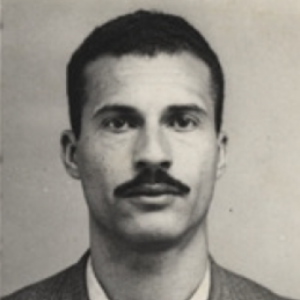
Carlos Marighella
*Carlos Marighella was born on this date in 1911. He was an Afro Brazilian politician and writer.
Marighella was born in Salvador, Bahia, to Italian immigrant Augusto Marighella and Afro Brazilian Maria Rita do Nascimento. His father was a blue-collar worker originally from Emilia, while his mother was a descendant of African slaves from Sudan (Hausa blacks). He spent his early life in the Baixa do Sapateiro neighborhood; he graduated from primary and secondary education.
Marighella was first arrested in 1932 after he wrote an offensive poem about the administration of Bahia. In 1934, he left the Polytechnic School of Bahia, where he pursued a degree in civil engineering to become an active member of the Brazilian Communist Party in Rio de Janeiro. In 1936, during the Getúlio Vargas presidency, he was again arrested for subversion. He was arrested again by the political police and remained in jail for a year. He was recaptured in 1939. He was not released until 1945, when an amnesty benefited all political prisoners during the country's democratization process.
The following year, Marighella was elected constituent federal deputy by the Bahian branch of PCB, but he lost his office in 1948 under the new prescription of the party. In secrecy, he occupied several offices in the leadership of the party. Invited by the Central Committee of the Communist Party of China, Marighella visited China between 1953 and 1954 to learn more about the Chinese Communist Revolution. In May 1964, after the military coup, he was shot and arrested by agents of the Department of Social and Political Order, the political police, at a movie theater in Rio. He was released in the following year by a court order. 1966, he wrote The Brazilian Crisis, opting for the armed struggle against the military dictatorship.
Later that year, he renounced his office in the national leadership of PCB. In August 1967, he participated in the 1st Conference of Latin American Solidarity in Havana. In Havana, he wrote Some Questions About the Guerrillas in Brazil, dedicated to the memory of Che Guevara and made public in September 1968. That same year, he was expelled from PCB and founded the Ação Libertadora Nacional (ALN) in February 1968. In September 1969, ALN members kidnapped the U.S. ambassador Charles Burke Elbrick in a coordinated move with the Revolutionary Movement. The group was responsible for several executions as well. After a series of successful robberies and kidnappings, the police force was determined to eliminate him.
Carlos Marighella was killed by police in an ambush on November 4, 1969, in São Paulo by police deputy Sérgio Paranhos Fleury, known for his work inside DOPS. Marighella is buried at Cemitério Público da Quinta dos Lázaros, a cemetery in Salvador, Bahia. His tombstone bears a quote from Marighella: "I didn't have time to be afraid" (Não tive tempo para ter medo).
Marighella's most famous contribution to revolutionary struggle literature was the Mini manual of the Urban Guerrilla. It advised disrupting and overthrowing a military regime as part of a Marxist revolution. It was first published in North America in July 1970 in English. Marighella also wrote For the Liberation of Brazil. The theories laid out in both books have greatly influenced contemporary ideological activism. Marighella's work was the latest tome in the small library of guerrilla literature in the 20th century as an advocate of urban guerrilla warfare to assist a larger-scale rural uprising.
The 2019 drama film Marighella was exhibited in international film festivals; Brazil's Agência Nacional do Cinema (National Agency of Cinema) has barred it from being distributed in the country, citing "subversive elements."